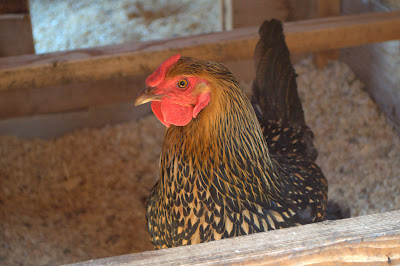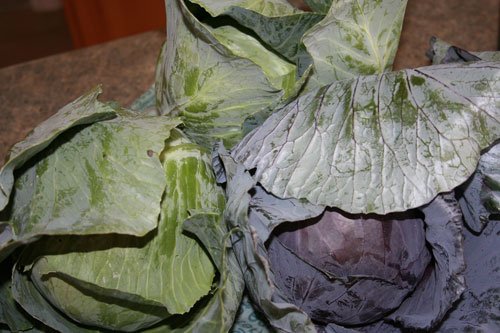Chickens Coming Home to Roost – In Our Backyard
Written by Sharon Kaufman, Contributing Writer
Backyard chickens – we have eight of them, each with her own personality. They’re named after some of the female characters from the Andy Griffith show – Helen Crump and Thelma Lou (Black Stars), Elly and Juanita (Golden Laced Wyandottes), Mrs. Mendelbrite (Plymouth Barred Rock), Aunt Bea and Clara Edwards (Rhode Island Reds) and Hilda Mae (Black Australorp). Though they’ve only been in our backyard for a little over a year, it has been great fun.
Why we decided to keep chickens
We decided to get chickens for several reasons:
1). After considering having chickens for the steady supply of high quality, organic eggs, I called to find out about city ordinances concerning backyard poultry. To my delight I was told there were none. And with no one living on either side of us and the house behind us empty and for sale, we knew there would be no objections from the neighbors.
2). But the catalyst for actually getting chickens came when our fenced garden area became overgrown with field bindweed. Not wanting to use chemical weed killers, we abandoned the area and turned our backyard lawn into vegetable garden instead. Field bindweed is nigh to impossible to get rid of, but we knew that chickens would take care of the problem and give us eggs and fertilizer to boot.
After purchasing two-week old chicks, we situated them in our shed in a lighted cage until they were fully feathered at eight weeks and ready to be turned loose in the old garden area. During their time in the shed, we built a coop for their protection during the winter months and at night.
A chicken salad bar with eggs
Once the chickens were outside, it didn’t take long before the field bindweed was mowed down and done away with. Great! But this presented a new challenge – no more salad bar for the chickens. By this time we had harvested our vegetable garden, so we turned the chickens loose to clean up that area. My, but they were happy, scratching out their living amidst this new paradise. They cleared out what remained of the vegetable plants plus weeds, bugs, snails and slugs and fertilized the entire area for the spring planting season in the process. The little troop really lightened our work-load.
Happy as they were, the chickens had not yet begun laying eggs. Now at about five months, we were ready for their golden globe rewards. Finally, two months later, the day after Thanksgiving, we struck gold – one egg. By early December they were all producing.
Still, after cleaning up our vegetable garden area, the chickens were again without forage. About this time the neighbor who watches over the vacant property next to us, noticed our barren backyard and asked about it. Upon hearing that the chickens were responsible, he hatched the idea to let them into the yard next door to dine, and thus do his job of maintaining the area. We asked the owners and they gave permission for us to actually cut out a hinged drop-down door in the fence so we could simply herd the chickens from their coop area into the yard next door.
No More Empty Nest
Having become quite attached to the hens, my husband, Robert, refers to himself as the “chicken-herder” and to me as the “chicken-whisperer”. They love being talked to and called by name. If you heard me you’d think I was speaking to my children (who, by the way, have all flown the coop). And shamefully, we do have our favorite – Mrs. Mendelbrite – the Plymouth Barred Rock. She goes where no chicken has gone before. When all the other chickens are panicked and running about (I imagine that they are shouting, “The sky is falling, the sky is falling”), Mrs. Mendelbrite remains calm and collected. On one occasion such pandemonium ensued because of a new food dish. All chickens scattered – all, that is but Mrs. Mendelbrite. She calmly strolled up to the hostile alien dish and singularly helped herself. If she could wear a shirt with a logo, it would say, “NO FEAR! (though I am a chicken)”.
The benefits of keeping chickens
Keeping chickens affords many benefits. Some that come to mind are:

- All your eggs in one basket daily – gathering organic eggs from pastured chickens is just one of the many charms of keeping chickens.
- Fertilizer – composted chicken manure makes the best fertilizer – our garden is better than ever.
- Pest patrol – no slugs, snails or other pests with chickens patrolling.
- Weed control – no need for chemical weed killers or lawn mowers with chickens as your gardeners.
- Child-magnet – children love to watch and feed our little backyard flock.
- Educational for children – beside learning all about chickens, caring for and feeding them teaches responsibility.
- Better than a chick-flick – it’s great entertainment just to watch the chickens being chickens.
- Plucky pets – chickens make spunky little pets, and if hand-raised will even enjoy sitting on your shoulder or in your lap.
- A little nest egg – where I live, pastured eggs sell anywhere from $6-$8 per dozen. I sell all of our “egg-stra” eggs.
From a birds-eye view, the benefits are:
- We’re eight happy chickens living the good life, eating bugs, grass, weeds and the like.
- We’re blessed to be absent from the concentration-camp-environment of the factory farm.
Of course all of this helps the environment as well.
Helpful links for keeping chickens
There is so much more to know about keeping backyard chickens. Here are some helpful links:
The View From the Farm
Henderson’s Chicken Breed Chart
Backyard Chicken Farming
Are you thinking about keeping chickens? If so, why does it interest you and what breeds are you considering?




we just got chickens this spring. my two year old LOVES going out each morning to get fresh eggs. they are such funny little birds, and we’re all enjoying having them–and the eggs!
I am so jealous! I have been trying to talk the hubby into chickens for almost a year with no success. I have a question for Sharon — it doesn’t sound like you’ve got netting or anything over the coop to protect your girls from predators. We have several large hawks in the area and one of the things I’ve considered if I ever get the green light is how to let them move around freely (we have a large yard) and yet still protect them. I have seen portable/moveable coops or runs — just wondering if you have the need to protect them? Thanks for the post and the pictures!
@elaine,
Hi Elaine,
We have done several things to protect the chickens from predators.
1. We lock them in their coop at night – literally, with padlocks – for protection from raccoons, possums, and other nocturnal predators. We also put the chicken food away at night so it doesn’t draw raccoons, etc.
2. Several months ago, my husband looked out the window one morning and saw a hawk sitting on one of the fences that encloses the chicken pen, an area about 10′ x 25′. The hawk had not flown over the chickens (we think he’d been casing them for several days before), but had flown in from the neighbors yard and landed very quietly on the fence. The chickens hadn’t seen him and were scratching away happily just below where he sat. I ran out and chased him away. Then we really had to put on our thinking caps as to what to do for protection, but without spending a lot of money. What we ended up doing cost us about thirty dollars and was super easy. We bought several rolls of fruit tree netting – the stuff you throw over, for instance, a cherry tree when the fruit is ripening to protect it from consumption by birds. We also purchased 4″ x 8″ pine boards. We zip-tied the pine boards (vertically) to the chain-link fence at the front of the pen and then attached the netting to the rear fence which is wood, and brought it out to meet the boards at the front of the pen, lapping it over the boards to cover the space between the top of the boards and the chain-link fence. We used a staple gun to attach the netting to the boards and wood fence. The whole process took about two hours. We’ve had absolutely no more problems and haven’t seen the hawk since. The netting even keeps wild birds out of the coop, which come to eat the chicken feed. They can spread lice and mites to domestic chickens.
3. The other protection is natural. The yard next door (where we turn the chickens loose to forage) is heavily vegetated by trees and bushes. I read that hawks like to swoop down on their prey, grab it and then be able to fly off. It seems they need a runway of sorts to get in and back out quickly. (If I am wrong about this, would someone reading it please correct me.) Anyway, the chickens can run under a bush for protections next door. We have never had a problem with hawks next door.
If you can put up obstacles that would hamper a hawk from swooping in and out of the area, it might deter an attack. We wondered what would have happened had I not chased the hawk away that day. Could it have grabbed a chicken without swooping down on it and then flown away with it? If not, would the hawk have eaten one of the chickens on the spot? I do know, but it took several days for us to figure out what we were going to do for protection. During that time we had put out obstacles in the pen – a beach umbrella, several shepherd’s hooks, a pitch fork planted in the ground, a decorative weather vane and other decorative pieces. The chickens were untouched during that time, but we are not sure if it was because of our efforts.
@Sharon Kaufman, Sharon, I think you are right about the habits of hawks. We’ve kept chickens for years now and had the foresight to NOT clear out all the natural brush and small trees in their “pasture”. Now, those trees are growing wonderfully and the brush provides fantastic cover from both the summer sun and the predators!
I think most folks erroneously think of chickens as “grassy pasture” critters, instead of the “woodland” critters that they really are. Mine spend almost all their time in our bushes, not in the grass – unless it has just been mown – they have learned to follow the mower for disturbed bugs and worms! They also love my shovel – they actually know to come running when I get the shovel out – they are very much in-the-way if I’m trying to dig anything!
Oh, I have found that with heavy breeds, such as yours, the hawk will not try to carry it off – it will kill, de-feather and attempt to eat it’s meal right on the spot. Thankfully I’ve not actually lost one this way, only interrupted its plans and was later able to rehabilitate the poor Orpington.
Wonderful article! My daughter and I truly enjoyed the names! All of ours are also lovingly named, so we’re kindred spirits, there!
@Sharon Kaufman, Excellent info – thanks. We lost a 9 month old kitty to what we guess is a hawk — he just disappeared one day without a trace. I’m so thankful you didn’t lose any chickens!
I desperately want to start keeping chickens! But I have NO idea where to begin or when to begin, so I love these kinds of posts. I have so many questions, I can’t wait to read through the links. Thanks!
I really want to have chickens when we transition from renting an apartment to owning a home one day. But I’m curious, how do they not fly away? Maybe that’s obvious…
I have thought of ducks also because my friend has them and said that as long as they don’t have a long enough “runway” they won’t fly away.
How would you compare duck and chicken stewardship?
@Jamie,
Hi Jamie,
Thanks for your question. We’ve never had a problem with the chickens “flying away” because they are a heavier breed. When I was researching what breeds to get that was one of the characteristics I looked for. Some of the lighter breeds are fliers.
But we did have a problem with them getting over the chain-link fence (half jump, half wing-flapping) for a while and into the vegetable garden to eat tomatoes, chard, etc. We solved that problem by attaching cheap landscape edging – the white flimsy wire kind – to the top of the chain-link fence. It not only made the 4-ft. fence a foot higher, but if they did make it to the top where the edging was, it was so shaky that it scared them and they would jump back in their pen. Eventually, they just stopped trying.
Another thought about where to start. Research, research, research before getting your chickens. Reiterating, one of the first things we did was to determine what characteristics we wanted in the chickens we would keep. The list went something like this: 1) Non-fliers; 2) Winter hardy – would continue laying and be able to stay warm; 3) Inclined to eat feed or forage; 4) Friendly toward humans, not skittish; 5) Medium-heavy breed, to discourage cats and hawks from attack though larger hawks are not deterred; 6) Darker colored, since white chickens are more easily seen by predatory birds; 7) Medium to large eggs; 8) Characteristically not broody (this is when a chicken will want to sit forever, without eating, on eggs to hatch them whether or not they are fertilized), since we decided against having a rooster.
Read all you can about getting started. If we had it to do over again, we would probably get more Plymouth Barred Rocks. We really like this breed. We also like the Black Stars. They are the friendliest of all the chickens. We would probably not get Wyandottes again, as these birds (ours anyway) are very domineering and impatient with the other chickens.
I really don’t know much about ducks other than they do need a water source, such as a pool. I think a plastic kiddie pool would suffice. That”s it. I’ve exhausted my knowledge about ducks. Perhaps someone reading this knows more and could comment.
Any other questions about chickens, please leave a comment and I’ll respond according to the brief experience we’ve had.
What a wonderful article about chickens! We currently have 23 with more being incubated by momma hens that are due to hatch out any day. I grew up having chickens and was THRILLED to get my own from a neighbor who was looking to downsize her flock. You are absolutely right that each one has it’s very own personality. We can often be found in the evenings or early mornings sitting in the shade just watching the flock. There is nothing more peaceful than a cup of coffee and the sounds of the flock happily scratching around looking for that special bug! We have lost all of the original flock, due to old age, losing our wonderful rooster, “Chanticleer” just a few weeks ago. His heritage lives on with four generations now scratching up the yard. I would highly suggest that anyone interested in raising chickens who has questions or concerns check out http://shilala.homestead.com/title.html. They have a wealth of information and a very helpful group of people on a message board whom I have consulted on many occasions thorough the years. Thanks for sharing your feathered friends with us!
I loved your article. I actually lost a chicken to a hawk on Sunday afternoon. I thought for sure it was big enough and I was in and out of the house with the chickens on and off while working in the yard. But it still got it. I too, have covered their enclosure so they are safe inside. But outside the area still poses a threat… we’re working on that… short of walking around the yard with them. I am thinking of netting off the garden area like you said and then they can run through the garden area and have a field day with all the weeds and bugs there.
My girls are about 4 months old… so hopefully they start laying eggs soon. We’ll just wait and see when they decide to start laying. I am so excited to egg those fresh, yummy eggs. Since buying our house last year we have been working hard at making everything in our yard have a purpose. It’s been great! We now have several fruit trees, a garden, and chickens. I truly love the feeling of becoming more self-sufficient.
Love your blog!!! Thanks for all your advice and information.
I can’t wait until we have a place of our own big enough to have chickens! My coworker tells the most entertaining stories of her hens Pearl and Henrietta, and I can definitely tell a difference in the eggs! Thanks for all the resources!
.-= Kait Palmer´s last blog ..My Parents with me in Spirit…or on a Sign… =-.
We have chickens on our ranch but we do not let them into the garden. We are concerned about diseases they might have in their droppings, like salmonella. We wash our eggs very carefully before using them. Is this a valid concern?
@Demi,
Hi Demi,
I think as long as you are raising your chickens in uncrowded conditions with a diet that is natural – some greens and bugs, etc, plus sunshine daily, you do not have to worry about salmonella, etc. It is chickens that are raised on factory farms, in very crowded conditions, on antibiotics, poor feed, never anything green, no sunshine that run the risk of carrying such pathogens.
Also, it is better if you do not wash the eggs, as freshly laid eggs have a protective “bloom” (coating) that prevents penetration of bacteria through the porous shell. Washing it off actually does away with that protection and allows the introduction of bacteria into the interior of the egg. With the bloom intact, if there is any pathogenic bacteria present (highly unlikely), it would be on the outside of the egg, not the inside. And when the egg is cooked, the heat kills the bacteria.
If I am using raw eggs, which I do in smoothies, to be on the safe side, I spray the egg (when I’m ready to use it, not before) with full-strength vinegar and then with full-strength 3% hydrogen peroxide and let it set for a few minutes. This effectively kills pathogenic bacteria.
One more thing that might be helpful, if you let your chickens into your garden area, be forewarned that they will eat many things that you do not want them to. Also, if you have vegetable plants there, fresh droppings will do damage to the plants. Chicken manure needs to be composted before its used as a fertilizer. We didn’t turn our chicken loose in our vegetable garden until after we harvested everything.
Hope this is helpful. Chickens are so rewarding to keep. It sounds like you have a nice layout.
I got my chickies this year- they are nearly 4 months old and our Barred Rock Plymouth that I picked out is my favorite too- very mellow personality but yet eager to try out the new foods. I am so excited for our first eggs… They are so funny to watch, way better than tv 🙂
Amazing price eggs go for in your area! They are anywhere from $3 -$4 here.
I would love to have chickens too! But, I have two dogs that would never leave them alone, even if the chickens were fenced. One of my dogs would become obsessed with getting her teeth into one. *sigh*. So, I would end up with stressed chickens, stressed chicken meat, and stressed eggs! It just wouldn’t be fair to the chickens.
Someday though, I plan on having chickens!
I keep thinking about raising chickens for eggs at our next home and this post makes me excited about it!
.-= Emily @ Random Recycling´s last blog ..Splurge or Steal: Antique Glass Jars =-.
I’m glad to hear that your birds were 7 months before they started laying. Everything I’ve ever read says they start laying at 6 months. We got our three chickens 6 weeks ago & they were supposedly 20-24 weeks old. Still no eggs yet. I was beginning to think the seller lied about their age and I just didn’t know enough about chickens to tell how old they were. I’m still hopeful that any day now we’ll be blessed with the appearance of an egg! – Carrie
Very very helpful article. We are get chickens for the 2nd time and this time I am doing it right. I’ll be sure to link to this post!
.-= Vanessa´s last blog ..Monday Maven =-.
Thanks for the article. Yesterday I let the chickens out before work as per my usual. When I got home two of my laying hens, seven babies and four baby turkeys were missing. I could hear them calling from the tall grass but could not find them. I left food out for them and hope they will find their way home today. Do they come home on their own? Any pearls fo wisdom would be appreciated. They are about 10 weeks old.